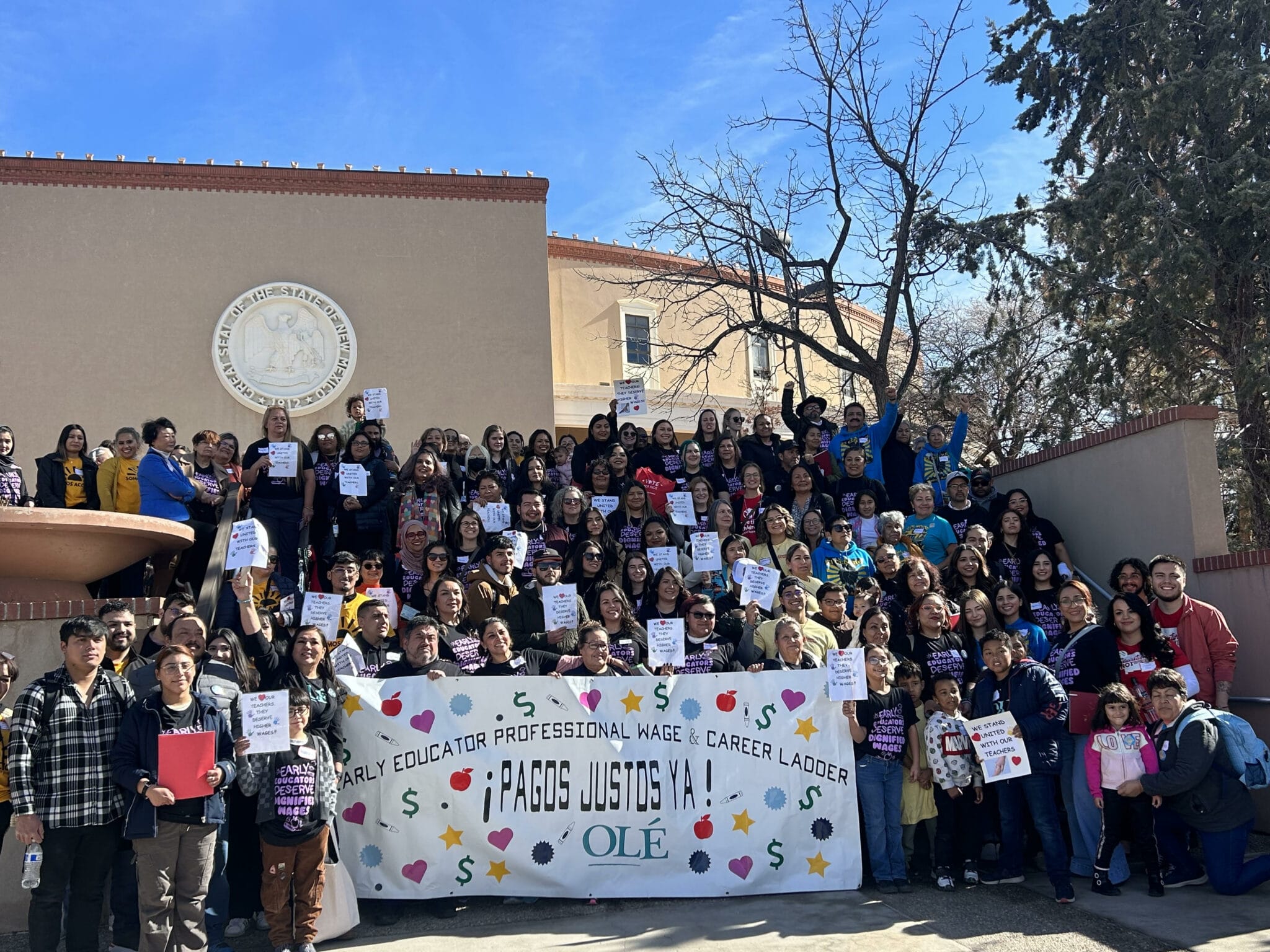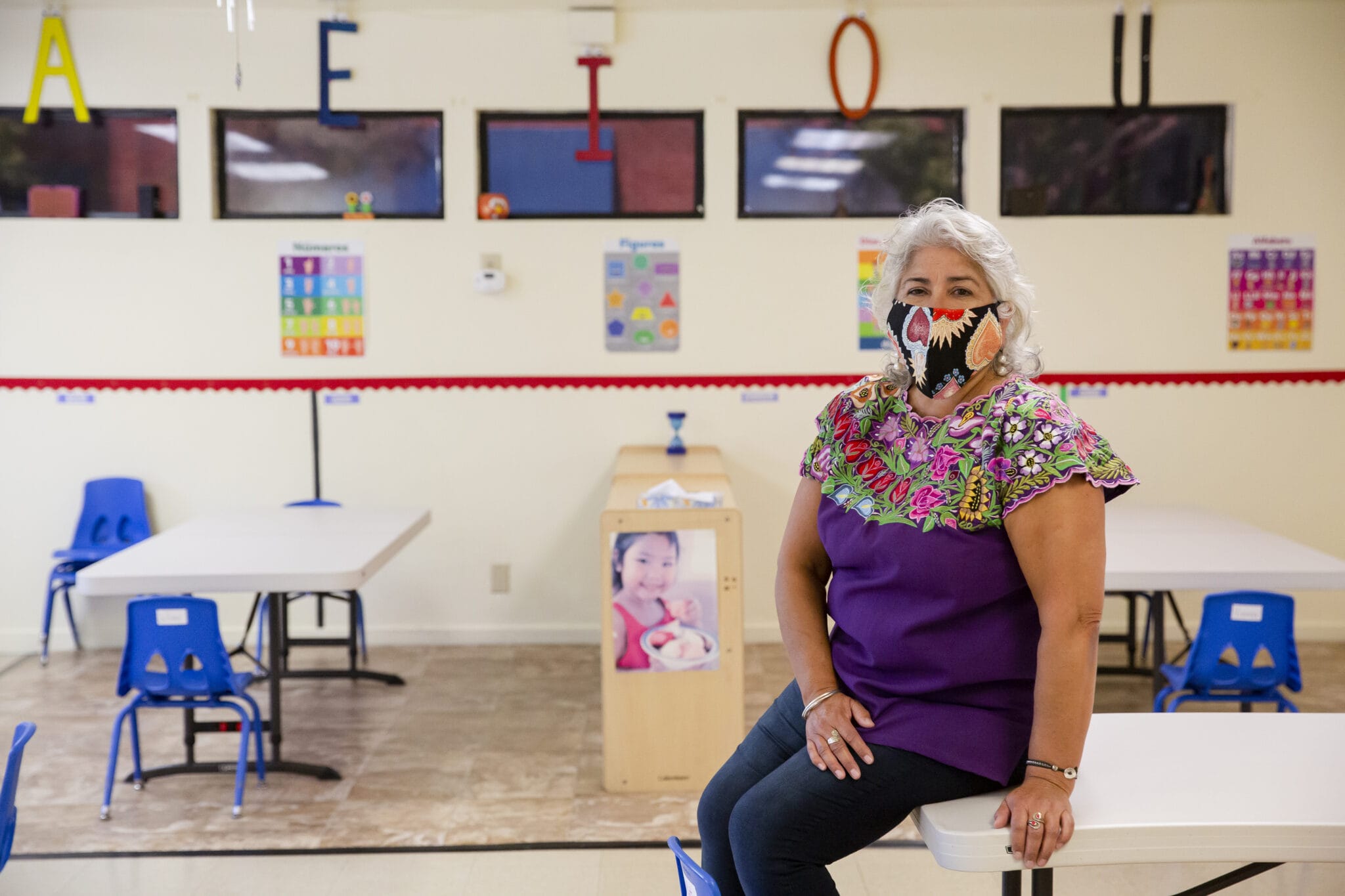My advocacy journey began ten years ago when I was trying to get help for a family and their child. If you would have told me then I’d be on a first-name basis with a Wisconsin state senator, I would have laughed.
I was five years into operating Corrine’s Little Explorers Family Child Care, which I founded in 2007, and I thought I was busy then. (I’m third from the left in both photos above: at a D.C. lobby day, and at my family child care center to the left of Emilie Amundson, the secretary of the Wisconsin Department of Children and Families).
A child with significant special needs had entered my program. She required constant support, like needing hours to drink an ounce of milk, and she was in constant pain. I couldn’t provide her with the care she needed or afford to hire anyone else, but if I didn’t keep her in my program, her mom or dad would have to quit their job. I didn’t want to leave them hanging.
Not long after, I connected with another child care center owner, Brooke Skidmore. We met at a local park where we brought children to play. Brooke had a similar challenge with a child with Down syndrome: she needed help and couldn’t afford to hire anyone.
We contacted our licensors and were both told that if we couldn’t meet the children’s needs, we should tell the parents we could no longer provide care. I contacted the county health and human services and was told that unless the child’s parents qualified for a subsidy, there was no financial assistance available to support that child.
From stage fright to empowered
I took the kids to story time at the library and noticed a sign announcing a Saturday town hall with our state senator, Jon Erpenbach (D). Brooke, the other provider, joined me. Neither of us had ever even contacted an elected representative before, let alone gone to a town hall. When they asked if anyone had any questions, I stood up and, with a shaking voice, shared our story and asked for help for these children. We didn’t want to expel them; we wanted to support them. The senator followed up with us, getting support from the State Superintendent of Schools, Tony Evers.
Superintendent Evers told Sen. Erpenbach he would fully support legislation on the issue because if these children had high-quality early care and education and wrap-around care, they would be more successful when they reached school age. The senator talked with us about next steps, the possibility of writing legislation, and finding ways through Medicaid to provide more therapy or support.
That was nine years ago. In February 2022, Sen. Erpenbach and State Representative Sondy Pope (D) co-introduced a bill to expand eligibility utilizing Child Care Development Block Grant funding for all children with significant special needs, no matter their family’s income. The bill had significant agency support and 29 co-signers within days. It advanced to the committees, then languished when our full-time legislative body gaveled out for the year. However, we are confident the bill will be reintroduced in January 2023.
Building early educators’ advocacy power
My advocacy journey hasn’t stopped since that first town hall meeting. I realized that our representatives work for us and their job is to create and fund policies that strengthen our communities. I realized that I am important, that politics isn’t only for those with power and influence, and that by participating in the process I could make a difference—and I have. But you can’t do it alone.
I also learned to start at the local and county level to procure grants that then can be turned into pilot programs or statewide programs. Yes, this time-consuming process is often frustrating, but I have found small gains can and do lead to great success. Even conversations that end in rejection teach me how to hone my message and strengthen my arguments. The same skills I use every day in my work with children (relationship-building, patience, and observation) are the same I use in advocacy.
Wisconsin Early Childhood Action Needed (WECAN)
Brooke and I transformed the network we had been cultivating for the past few years into Wisconsin Early Childhood Action Needed (WECAN) in 2020. It’s a grassroots group that connects parents, ECE and child care professionals, other business owners, and community members. We’re proud to have nearly 700 members on our mailing list and more than 500 in [DM4] our Facebook group. We have zero budget and do everything in our spare time.
WECAN’s priority issues include:
- ECE compensation and how low wages impact worker turnover and our communities;
- How FCCs and GCCs [DM5] are businesses and the importance of creating relationships with the business community;
- The need for public investment; and
- How voters can support educators’ needs.
We host trainings to build educators’ confidence as advocates and debunk “imposter syndrome.” These free events are held via Zoom and offer continuing education hours. For one workshop on Wisconsin’s legislative and budget process, we were joined by Sen. Erpenbach and Rep. Pope.
During the state budget process, we helped WECAN members create messages on how child care impacted each section of the budget. When they had the opportunity to speak, they did so with confidence. In short, we’re empowering early educators across Wisconsin to get involved in the policymaking process and witness how their stories are important and can make a difference. I continue to work so hard because it’s so powerful to watch people speak up and really understand their own power, and that their voices matter. This is how change is created. This is how a democracy works: you participate to get the policies and funding.
ECE and child care professionals must see themselves and be seen as professionals who are knowledgeable, trusted sources. We need to work with the regulatory and nonprofit agencies that purport to support us, to ensure that their policies and funding are truly needed by the ECE field. It’s only when all players in the field act with integrity that we can move forward together to create a system that truly meets the needs of the professionals, families, and our communities. Because we matter!



